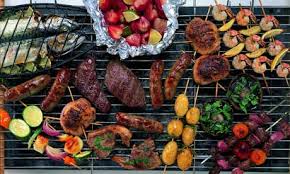Grilling outdoors is the highlight of the spring and summer months. The smell of the smoky embers, while tantalizing, can forewarn of possible carcinogenic food changes during the grilling process. Knowing what these changes are doing to the food and how to lessen your exposure to them is important not only for food safety, but also for personal health.
Since the 1990’s, research has been focusing on the production of PAH’s (polycyclic aromatic hydrocarbon’s) and HCA’s (heterocyclic amines) when food is exposed to high temperature open-flames. The burning creatine, a protein found in meats, changes the composition of the meat and renders it potentially harmful for consumption. “Researchers found that high consumption of well-done, fried, or barbequed meats was associated with high risks of colorectal, pancreatic, and prostate cancer” (NIH).
HCAs and PAHs have been found to be mutagenic—that is, they cause changes in DNA that may increase the risk of cancer (Cancer.gov). Red-meat sources, such as steaks, ribs, and sausage, are particularly high in the production of PAH’s and HCA’s, increasing the risk up to 3.5x higher than oven-cooked or broiled meats (Mind Body Green).
When the barbeque starts smoking from dripping fats, it leads to food contamination and the destruction of the normal fat, protein and carbohydrate structure of the meat itself. The smoke emits carbon monoxide and PAH’s, which are both harmful to the lungs. The PAH’s enter the body’s cells and can precipitate damage to the mitochondria and DNA, both of which are necessary for proper cellular repair and function (Dr. Axe).
At this point you may be wondering if it’ll ever be safe to grill again. The answer is yes. By taking simple precautions, you can continue to enjoy a wonderful meal cooked outdoors:
- Precook your meat by stove top or oven before firing it up on the grill to reduce drippings and lower levels of PAHs.
- When cooking red meats, open the grill to allow the smoke to dissipate, and only sear the meats to medium-rare; finish cooking the meat in the broiler or oven if needed.
- Avoid factory-farmed meats/non-organic meats that carry harmful medications, such as ivermectin (animal wormer), flunixin, penicillin, and ciprofloxacin, that are linked to neurological impacts, allergic reactions, and kidney damage.
- Avoid nonstick accessories such as actual grates, spatulas, grilling griddles, pans, and mats. The perfluorooctanoic chemicals and related compounds found in the nonstick cookware can be linked to obesity, abnormal thyroid levels, and toxicity in the brain, liver, prostate, and kidneys (Dr. Axe).
- Focus more on chicken and fish because they have less creatine in the muscle meat.
- Think outside the meat department. A wide array of vegetables and fruits, such as pineapple, can both be safely grilled, since they contain no creatine.
- Don’t let meats become blackened and charred; this is a recipe for carcinogens!
- Avoid store-bought marinades, which are usually thicker and contain ingredients like sugar, high fructose corn syrup, or even honey. Sugary marinades have been proven to actually triple HCA levels, while marinades such as teriyaki reduce. Opt for thinner vinegar or lemon juice-based marinades. Find something that is rich in herbs and spices—like carcinogen-neutralizing rosemary. Herbs that contain antioxidants that protect meats during grilling include basil, mint, rosemary, sage, savory, marjoram, oregano and thyme (Mind Body Green). These can be rubbed directly onto the meat or put into the marinades for added flavor.
- Stop wrapping potatoes and other food in aluminum foil in order to achieve those high temperatures. A study in the International Journal of Electrochemical Science found that exposing foods in aluminum foil to heat caused leaching to occur in levels unacceptable to the World Health Organization (Dr. Axe). Aluminum has also been long known to be neurotoxic, with mounting evidence that chronic exposure is a factor in many neurological diseases, including dementia, autism, and Parkinson’s disease.
Enjoying the backyard barbecue with food safety in mind can be accomplished through simple steps of preparation, marinades, and venting the grill to allow poisonous vapors to blow off. Keep food lightly seared, and avoid blackening the meats. Try grilling fruits and vegetables for added variety and flavor. Summer grilling, or year-round for those willing to brave the harsher weather, can be safely accomplished with these measures.
Forum Health Clarkston
7300 Dixie Hwy. Ste 500
Clarkston, MI 48346
248-625-5143
References:
Cancer.gov
Dr. Axe
Mind Body Green
NIH – National Cancer Institute


